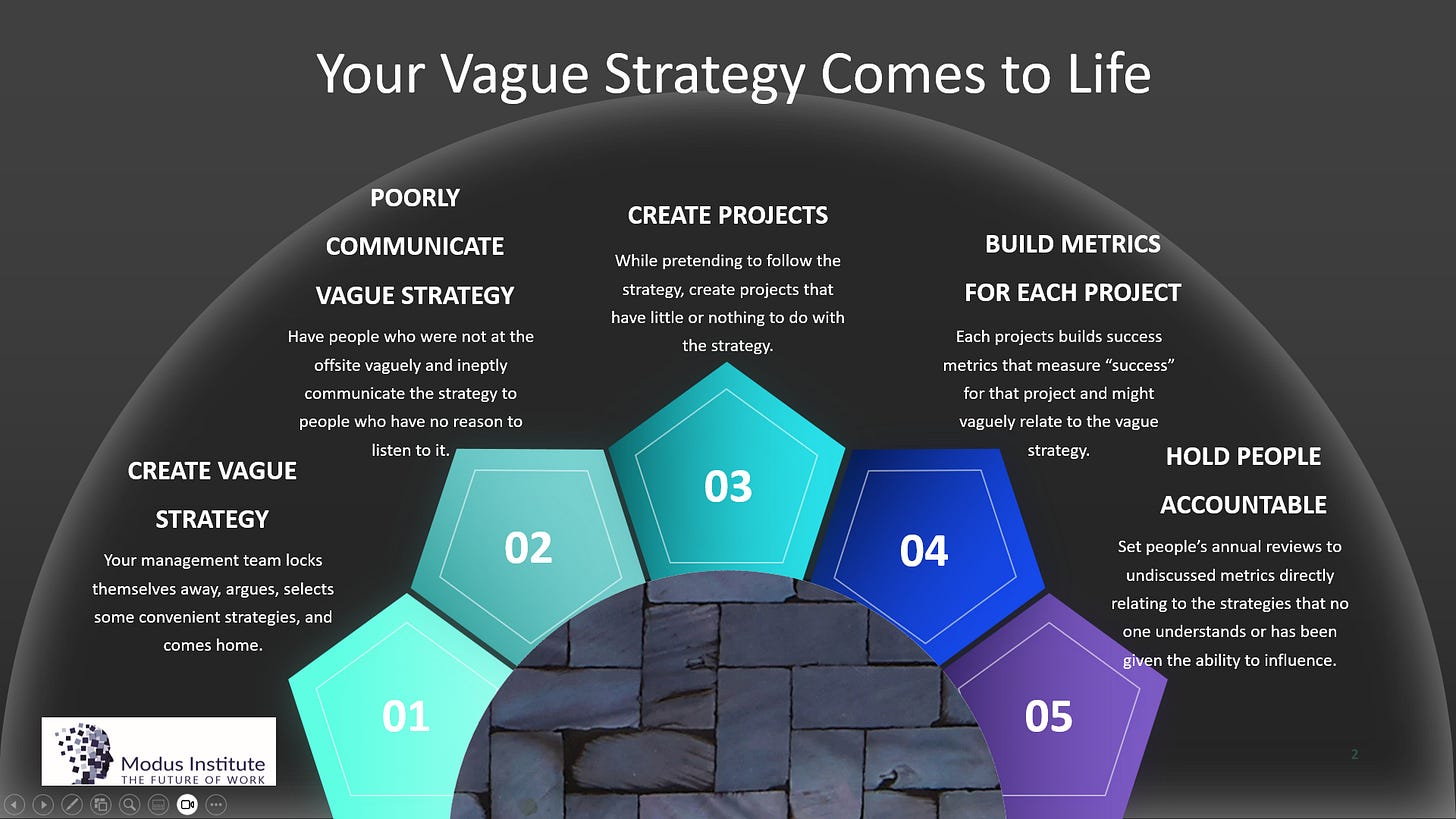Every Metric Weakens Your Strategy
Part One: Metrics are Part of, Not All of, Understanding Work
We would like, at some point, to know what we are doing and why.
Our work starts with a goal, something we want to achieve. That’s followed by strategies, a set of ways (plural) to achieve that goal. That’s followed by projects (also plural), which are ways to achieve the strategy. While you are doing the project, you have metrics (plural but not bloody infinite) that give you hints if your project is successful at achieving the strategy.
Any metric’s value is directly proportional to its understood relationship to strategy.
This is a problem because most teams have no idea how their project fits into any strategy whatsoever. Strategy is derived in an offsite attended solely by people they rarely or never have even talked to. It has then, if they are lucky, been distributed via vagaries and pomp in the most inactionable of ways.
This means that no one understands the strategies of the company, which means they don’t know they goals, which means, even if the metrics show “success” …no one is actually sure what success means.
Look, we really do need to measure things, but if you are wondering why you have too much work to do, why direction changes without reason, and why you have so many metrics, it’s because of this: people think metrics mean you are measuring the impact of your work and the more metrics the better.
To put a finer point on it, if you are wondering why your career is suddenly only metrics (billable hours, NPS, how many widgets you wadgetted), it’s because we have a fundamental problem with wanting measures to do our work (think AI before AI). It’s so much easier for a boss to check a bunch of boxes, come up with a “scientific” measure of your awesomeness (or lack thereof) and reward or penalize you based on the resulting Salesforce report.
The truth is every metric introduced gradually erodes strategic focus, creates toxic behaviors, and transforms professionals into metric-chasing automatons rather than value-creating humans. Metrics without meaning kill meaningful work. We need to do better.
Goodhart and Campbell: When Measures Become Masters
Goodhart's Law: "When a measure becomes a target, it ceases to be a good measure".
Campbell's Law: "the more any quantitative social indicator is used for social decision-making, the more subject it will be to corruption pressures and the more apt it will be to distort and corrupt the social processes it is intended to monitor."
Almost every metric you find is a target, not a metric. It has a goal for success, which means you use it as the destination and not compass.
Charles Goodhart made a nearly-Schrodinger-level statement about how we work "any observed statistical regularity will tend to collapse once pressure is placed upon it for control purposes". This is a lot of words to say this: If you try to control what you are measuring, what you are measuring will resist.
But we want control. We want certainty. We want to calm the noise…so badly…that we are willing to lie to ourselves and use metrics to do it. This is natural. It’s what humans do.
This is known as the “Illusion of Control” which in this case is related to “Quantification Fixation” where we give up our understanding of the nuances of a system for some metric we have concocted.
When we create metrics is natural for us to immediately treat them as performance targets. In fact, it’s very difficult for us not to. We are looking to “win.” And we inadvertently treat the metric as more important than the underlying strategic objective it was meant to track…and a general toxic trend of work is that almost all metrics have a “win” point and that encourages us to make it a target.
And, god help us all, someone else is judging us by those same “wins”. That metric means your bonus, your promotion, or your dismissal.
As this spreads, from developers gaming code coverage metrics to sales teams manipulating lead qualification criteria to hit their numbers, the metric becomes the master, and strategy becomes the servant or more often simply forgotten.
Metric Overpopulation is a Global Crisis
Information Chaos and Decision Paralysis
"Metric overpopulation," where we are overwhelmed with excessive metrics without strategic focus, is not, as you might guess, us looking closely at many metrics, it’s quite the opposite. It’s when there are metrics with no tie to strategy, therefore no relevance, and therefore either ignored or tracked with fear.
Teams become unable to distinguish between signal and noise, spending more time managing metrics than creating value or ignore them and fudge the numbers at reporting time.
The Disconnect Between Strategy and Measurement
As we’ve investigated toxicity in the workplace, there are superspreader events (places where a lot of different toxicities are born and spread from). These usually center around hoarding information, decision making, or direction and then expecting the rest of the company to just “follow orders.” And yes, these are orders without context, which makes every order vague and unactionable. And yes, this comes back to understanding the “why” of what we are doing and that “why” rests in the strategy.
When strategy is created in a vacuum by a small group of people on a “leadership retreat,” the (hopefully) deep conversations that lead to the strategies are lost on everyone else. Strategy, therefore, must be a collaborative creation in the company. The “why” of the “whys” (or vice versa) is strangely key to creating and understanding the metrics we use to measure our work.




Jim, I appreciate this post and look forward to part's 2-4. I am engaged in a research effort to look at project success metrics. my areas of interest are very similar to yours: Simplicity-First Measurement, Tailoring metrics, Dysfunctional Metrics..